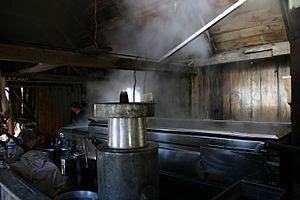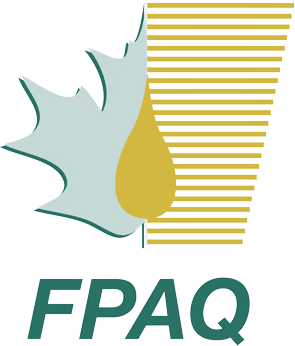Quebec Maple Syrup Producers facts for kids
 |
|
| Abbreviation | QMSP |
|---|---|
| Formation | 1966 (59 years ago) |
| Type | Cartel |
|
Region served
|
Quebec |
|
Membership
|
7,300 maple syrup producers |
|
Official language
|
French, English |
|
President
|
Luc Goulet |
|
Formerly called
|
Federation of Quebec Maple Syrup Producers |
The Quebec Maple Syrup Producers (QMSP), also known as French: Producteurs et productrices acéricoles du Québec, PPAQ, is an organization that helps manage and sell maple syrup from Quebec. Before 2018, it was called the Federation of Quebec Maple Syrup Producers.
This group is very important for maple syrup. In 2011, it produced 94% of all Canadian maple syrup. It also supplied 77% of the world's maple syrup. The QMSP helps organize sales both inside and outside Quebec.
Contents
How the QMSP Started
Maple syrup producers in the Beauce region of Quebec began working together in 1958. They wanted to protect their rights and sell their maple syrup as a group. This idea grew, and in 1966, a bigger agreement was made for all of Quebec.
Since 1989, all QMSP producers follow a special agreement to sell their products. Together, they decide on rules and how to sell their syrup. They also set limits on how much syrup can be made, make sure the quality is good, and promote maple syrup. The QMSP also works with the ACER centre to do research on maple syrup.
In 2000, the Federation became the only seller for large amounts of maple syrup. In 2004, they updated their system for how much syrup each producer could make. By 2017, they had to add five million more "taps" (places where syrup is collected from trees). This was because more maple syrup was being produced in other countries.
Promoting Maple Syrup Around the World
The QMSP does many things to help sell maple syrup globally. They hold cooking contests in Quebec, Japan, and the United States. They have also had special events in Hiroshima with free maple syrup tastings.
In 2010, chefs in Hiroshima took part in a cooking contest. They had to create new recipes using maple syrup. The QMSP wants more people in Japan to know about and buy their maple syrup. They even made a deal with Tokyo DisneySea, a Disney theme park, to promote maple syrup there.
In Quebec, they also work to keep the love for maple syrup alive for future generations. They hold cooking contests for traditional family recipes. Teachers are also encouraged to teach students about maple trees and syrup production. They can use a new maple syrup encyclopedia to help them.
The Maple Syrup Reserve
The QMSP keeps a large amount of maple syrup in a special storage area. It is officially called the International Strategic Reserve (ISR). Some people call it the "OPEC of the maple syrup world." This reserve helps keep maple syrup prices stable and makes sure there is always enough supply.
A barrel of maple syrup is worth a lot of money. It is much more valuable than a barrel of oil. The reserve is kept in large warehouses in Quebec towns. The first two storage places were in Saint-Antoine-de-Tilly and Plessisville.
History of the Reserve
The strategic reserve was started in 2000. In 2008, there wasn't much maple syrup produced for a few years. This caused the reserves to become very low. Prices went up, and some markets for pure maple syrup were lost.
In 2011, there was a huge amount of maple syrup produced. So, the QMSP added a third warehouse in Saint-Louis-de-Blandford. This warehouse could hold even more syrup.
In August 2012, a large amount of syrup was taken from the new warehouse in Saint-Louis-de-Blandford. This event became known as the Great Canadian Maple Syrup Heist. About a quarter of the syrup in that warehouse was missing. Police later found some of the stolen syrup. Much of it had been sold to people who didn't know it was stolen. The story of this event is shown in the Netflix documentary series Dirty Money.
In 2018, some maple syrup producers, Nathalie Bombardier and Daniel Gaudreau, had their syrup taken by the police. This was because they wanted to sell their extra syrup directly to businesses. They did not want to sell it through the QMSP.
In 2021, the QMSP announced they would release a lot of maple syrup from the reserves. This was to meet the high demand around the world. The maple syrup industry had very successful years in 2019, 2020, and 2021. Experts believe that more people cooking at home during the COVID-19 pandemic led to this increased demand for maple syrup.



